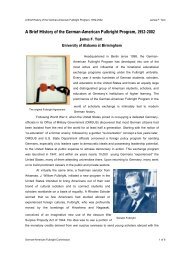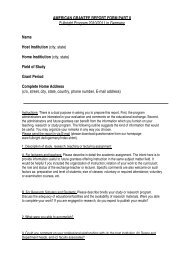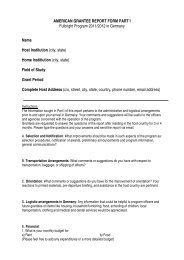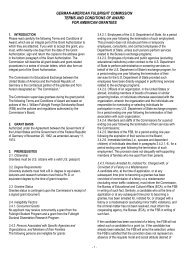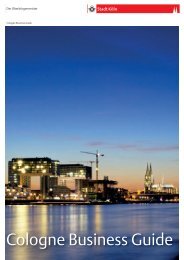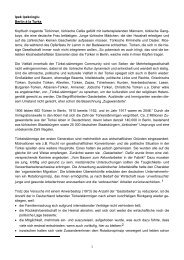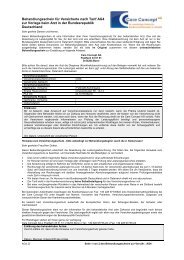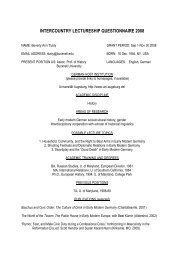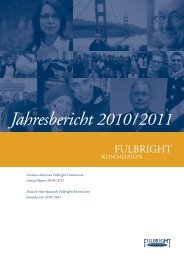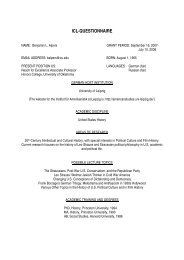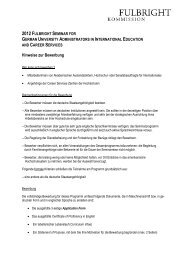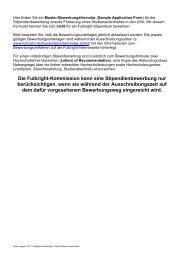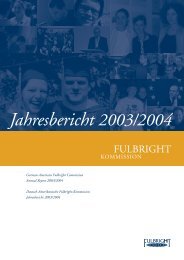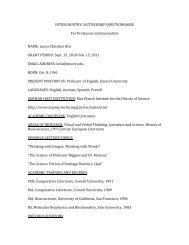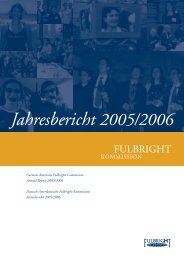The First Class of Fulbrighters - Fulbright-Kommission
The First Class of Fulbrighters - Fulbright-Kommission
The First Class of Fulbrighters - Fulbright-Kommission
You also want an ePaper? Increase the reach of your titles
YUMPU automatically turns print PDFs into web optimized ePapers that Google loves.
<strong>The</strong> mother took in laundry from the U.S. military<br />
base. She heated water on the coal stove, washed the<br />
clothes, then dried them on ropes stretching across the alley<br />
with the aid <strong>of</strong> a pulley system. I was charged 25 marks a<br />
month for bed, breakfast, and laundry. After the son departed<br />
for school I would sit across the table from the parents,<br />
who knew no English, and read a phrase from my phrase<br />
book. <strong>The</strong>y would laugh, correct my pronunciation, and we<br />
would continue for many hours. While they were not educated,<br />
they were fine teachers. Within a month we could<br />
When people met me, they knew I was a<br />
foreigner because <strong>of</strong> my accent, but they<br />
guessed that I was from Holland or<br />
Denmark and were very surprised to<br />
learn that I was American.<br />
discuss the finer points <strong>of</strong> daily life, death, and taxes.<br />
Because classes did not start for a month, I bought a<br />
bicycle and rode to youth hostels in Augsburg, Ulm,<br />
Stuttgart, Tübingen, Rothenburg, Würzburg, Frankfurt,<br />
Idar-Oberstein (they said I was the first American they had<br />
seen since the war), Trier, Brussels, Antwerp, Rotterdam,<br />
Amsterdam, and then back to Germany for the train ride<br />
back to Munich. Day rooms in youth hostels were a great<br />
way to meet people from all over the world.<br />
Back in Munich I studied physics at the university.<br />
Another <strong>Fulbright</strong> student was an opera singer, so we<br />
would line up ten minutes before the opera performances,<br />
show our student cards and acquire any unsold seats for<br />
only two marks. On many weekends the son <strong>of</strong> my host<br />
family took me skiing in the Alps. Chair lifts were too<br />
expensive so we would walk up the hills, then ski down.<br />
When the <strong>Fulbright</strong> Commission sponsored a meeting<br />
in Berlin, all 250 <strong>Fulbright</strong> students rode a train through<br />
the Russian zone to Berlin and were able to travel to all<br />
Berlin sectors. <strong>The</strong> music students discovered that they<br />
could convert West marks to East marks at a very favorable<br />
exchange. <strong>The</strong>y returned to the East zone and came back<br />
loaded with music books.<br />
During a vacation period I discovered that the Turkish<br />
Maritime Line would transport students for 25% fare. I<br />
boarded at Naples, with stops in Athens, Istanbul, Izmir,<br />
Beirut, Alexandria, and Venice. High points were climbing<br />
the great pyramid and visiting the Valley <strong>of</strong> the Kings at<br />
Luxor.<br />
<strong>The</strong> goal <strong>of</strong> the <strong>Fulbright</strong> program is to promote international<br />
understanding. It really does. One family revealed<br />
that they hesitated to <strong>of</strong>fer a room to an American woman<br />
because, “American women drink, smoke, and wear lots <strong>of</strong><br />
makeup, and they didn’t want their daughter to be exposed<br />
to those kinds <strong>of</strong> influences.” <strong>The</strong>y were pleasantly surprised<br />
when their <strong>Fulbright</strong> scholar was modestly dressed<br />
and behaved politely, unlike what they saw in American<br />
movies. When people met me, they knew I was a foreigner<br />
because <strong>of</strong> my accent, but they guessed that I was from<br />
Holland or Denmark and were very surprised to learn that I<br />
was American.<br />
SPENDING A YEAR IN GERMANY really<br />
changed my life. I learned how others live, and how they<br />
feel about many situations. I was charmed to see children<br />
walking to their first day <strong>of</strong> school carrying a large cornucopia<br />
<strong>of</strong> treats their parents had given them. In Munich<br />
during the pre-Lenten Fasching festivals there was a ball<br />
every night. On Shrove Tuesday they made rounds carrying<br />
a c<strong>of</strong>fin and singing “Fasching is dead!” Germans were tolerant<br />
toward interracial dating in a way that would not have<br />
been possible in America in the early 1950s. And they<br />
loved the German Lieder; some <strong>of</strong> the <strong>Fulbright</strong> musicians<br />
were requested to sing at women’s meetings.<br />
During my <strong>Fulbright</strong> year, I developed a taste for travel<br />
and for learning about other cultures. I have taken every<br />
chance I have had to spend time in foreign countries,<br />
meeting the people and learning their ways. My family<br />
has traveled with me many times (including visiting my<br />
German family) and enjoys promoting further international<br />
understanding.<br />
John G. Webster received a B.E.E. degree from Cornell University, NY, in 1953,<br />
before spending a year at the Universität München on a <strong>Fulbright</strong> scholarship. He<br />
earned M.S.E.E. and Ph.D. degrees from the University <strong>of</strong> Rochester, Rochester,<br />
NY, in 1965 and 1967. He is Pr<strong>of</strong>essor Emeritus <strong>of</strong> Biomedical Engineering at<br />
the University <strong>of</strong> Wisconsin-Madison. In the field <strong>of</strong> medical instrumentation he<br />
continues to teach undergraduate and graduate courses, and is involved in research<br />
on radi<strong>of</strong>requency cardiac ablation (heating) to improve cardiac rhythm and<br />
hepatic ablation to cure cancer. Webster is the editor <strong>of</strong> Medical instrumentation:<br />
application and design, Third Edition, Encyclopedia <strong>of</strong> electrical and electronics<br />
engineering, and 15 other books. He has been married to his wife Nancy since<br />
1954. <strong>The</strong>y have four children, seven grandchildren and they all enjoy travel.<br />
War ruins greeted Webster upon his arrival in Munich.<br />
44 45



